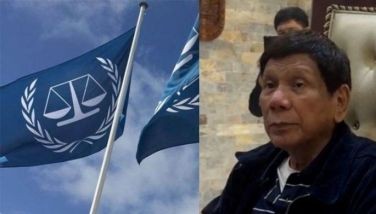‘The imperative of the rule of law’
MANILA, Philippines – The significance of the much awaited ruling of the Philippine case filed at the Permanent Court of Arbitration (PCA) in The Hague released yesterday goes beyond just the Philippines but is a test of how nations in East Asia value the international rule of law.
The ruling of the PCA is binding on the parties but it does not have the power to enforce its decision. But non-compliance is seen in a similar light as a violation of treaty obligations – in this case the UN Convention on Law of the Seas (UNCLOS) – to which the Philippines and China are signatories.
The Philippines has said that it will abide by the ruling – including whatever the decision is on the nature of Itu Aba and its maritime entitlement (but which does not resolve the sovereignty issue). China on the other hand has said it will not recognize the ruling and will continue with its reclamation and construction on features over which it claims sovereignty. To date, China has turned what were once half submerged reefs into sizable islands, totaling 13 square kilometers, on to which, it has built sizable military and civilian infrastructure. It has not ruled out future military action to enforce its claims, including construction on the Scarborough Shoal or the imposition of an air defense identification zone (ADIZ) over the area.
From the Philippine standpoint, the realistic goal in filing the case was to shift the dynamics of the South China Sea conflict, from power politics to which it has no chance of winning to one of respect for international law and mutlilateral institutions. Any ensuing settlement of the dispute – or any temporary arrangements putting aside the sovereignty issue – would then have to be based on the rule of law.
A Wolf in Sheep’s Clothing
The hope is that the ruling would place the weight of world opinion that sees China’s assertion of historic and legal rights giving it “indisputable sovereignty” over the SCS/WPS is questionable at best. It does not help China’s case that it has continued to reclaim and militarize the features under its control belying its own oft-repeated peaceful and responsible intentions over one of the most important global trade routes.
Trust is a big issue here and China has no one to blame but itself. Despite proclaiming a policy of “peaceful rise”, it has done more to undermine it rather than reinforce it. Some analysts have called this penchant for China, to portray itself as a benevolent power with benign intentions and yet take contradictory actions to brusquely assert its superiority, as “strategic doublespeak”.
Such actions, as the creeping occupation of the SCS/WPS in violation of the Declaration of Conduct for the SCS, is made more threatening by China’s bellicose rhetoric about “core interests” and their readiness to go to war to defend them, has made its neighbors see China in a more menacing light.
Many of China’s neighbors are uncomfortable living next door to a superpower whose future intentions remain opaque and unpredictable. They are quite reluctant to have China become the “policeman” of the region guaranteeing among others, freedom of navigation. Ironically, some countries in the region feel more comfortable with Japan taking on a more central role in that aspect.
But surely, China must value how it wants to be perceived by the world since its reputation would also affect its ability to influence political and economic events globally and regionally. It cannot forever afford to generate enmity with its neighbors if it wants them to accept its legitimate aspirations. Otherwise they will continue to coalesce to restrain China’s ambitions. This is why China’s recent overtures to its neighbors including the “One Belt, One Road,” a resurrection of the ancient Silk Road, to which China has committed massive investments in infrastructure, has not received as much enthusiastic backing as China had hoped. Even its Asia Infrastructure Investment Bank has not only received lukewarm reception but outright opposition.
By adhering to the rule of law, China now has an opportunity to cast aside this perception of “a wolf in sheep’s clothing”.
ASEAN Has A Stake In This
So how must the Philippines react to such dynamics? I would think that we should use the ruling as the focal point to keep the pressure for China to be more restrained in its actions and to shift its behavior to be more in line with international law. Despite its apparent defiance, China cannot appear to be in express violation of internationally accepted principles particularly as adjudicated by an international body imbued with final and binding authority. But we cannot do that on our own.
The EU, Australia, Japan and others have called for the Philippines and China to abide by the ruling of the Court. Ironically, ASEAN members have yet to do so collectively.
Yuriko Koike, member of the Japanese National Diet and Japan’s former defense minister, puts the case forward of how Asian unity is critical to their well-being when she wrote: “All Asians must recognize that their countries and region are equally vulnerable to those who would undermine the rule of law and today’s existing structures of peace and prosperity, flimsy as they may be.”
She said one lesson from Brexit is that economic forces alone do not furnish the sense of cohesion or solidarity needed to sustain the project of unification. That has been the case for Asia and she has called for a new imperative and a new sense of mission around which to rally, which is adherence to the rule of law. “Asian democracies have a clear opportunity to forge a sense of solidarity among themselves. This can only happen if they are not only attuned to and cooperate among themselves in respect of market forces, but unite together in the observance of the rule of law.”
She said that the ruling of the PCA provides an opportunity to test the ability, and willingness, to build a sense of regional stability: “If Asia’s democracies stand behind the Court’s ruling, whatever it is, they can begin to demonstrate that, with a shared sense of purpose, they are prepared to defend the rule of law - and each other.”
It is my fervent hope that our ASEAN partners see it this way. And I believe that despite the failure to issue a collective statement calling for restraint on China’s actions in the SCS/WPS, that this is in fact a hopeful sign.
Roberto R. Romulo, former secretary of foreign affairs
- Latest
- Trending



























